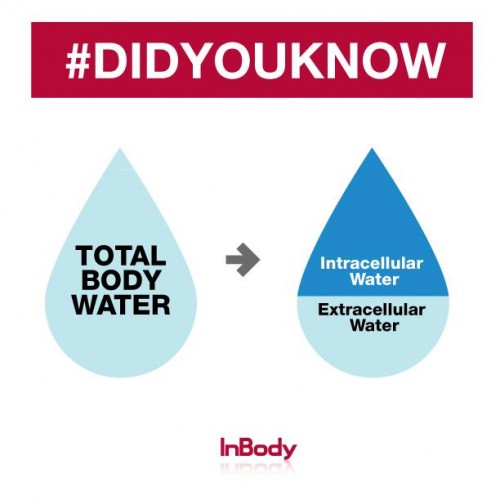 Total Body Water = Intracellular Water (ICW) + Extracellular Water (ECW). Your blood makes up part of the total body water (TBW). Your overall weight can be 45-65% due to total body water, depending on age, gender, and fitness level. Your body water can be found not only in your blood, but also in your muscles, your fat, your organs, and inside every cell in your body. The water located outside of your cells (which includes your blood) consists of nearly 1/3 of your total body water. The water outside your cells is important because it helps control the movement of electrolytes, allows oxygen delivery to the cells, and clears waste from metabolic processes. The water inside the cells (intracellular water) comprises of 70% of the content of the cells (the cytosol) and in healthy people makes up the other 2/3 of the total body water. It is the location of important cellular processes. The most important function of the water inside our cells is to allow molecules, chemicals and nutrients to be transported to and from different parts (or organelles) within the cell. Essentially the ICW picks up from where the ECW left off by continuing the pathway for fuel to be transported to the cell.
Total Body Water = Intracellular Water (ICW) + Extracellular Water (ECW). Your blood makes up part of the total body water (TBW). Your overall weight can be 45-65% due to total body water, depending on age, gender, and fitness level. Your body water can be found not only in your blood, but also in your muscles, your fat, your organs, and inside every cell in your body. The water located outside of your cells (which includes your blood) consists of nearly 1/3 of your total body water. The water outside your cells is important because it helps control the movement of electrolytes, allows oxygen delivery to the cells, and clears waste from metabolic processes. The water inside the cells (intracellular water) comprises of 70% of the content of the cells (the cytosol) and in healthy people makes up the other 2/3 of the total body water. It is the location of important cellular processes. The most important function of the water inside our cells is to allow molecules, chemicals and nutrients to be transported to and from different parts (or organelles) within the cell. Essentially the ICW picks up from where the ECW left off by continuing the pathway for fuel to be transported to the cell.
A healthy body water distribution has been estimated at a 3:2 ratio of ICW:ECW. If your body water falls out of balance, this can signal changes in your health and body composition. Whether these changes are positive or negative depend on which type of water becomes unbalanced. Having slightly more water inside the cell than normal isn’t necessarily a bad thing, in fact, it can signal healthy changes! When muscle cells become enlarged, they are able to take in (or require) more water in order to power their cellular function. Research has shown that resistance exercises can lead to increased intracellular water in humans. Increased ICW as a result of exercise is a sign of increased lean body mass, which is a very good thing and has positive health benefits, including: increased energy use (increased basal metabolic rate), increased strength, increased immune system.
Excess extracellular fluid water (water outside the cells) unlike increased intracellular water, is something you do not want to happen. Excess water outside your cells (ECW) can indicate health risks such as inflammation. Increased extracellular fluid is also seen in kidney failure when the body is not able to effectively get rid of water, or in heart failure when a weak heart is not able to pump or circulate blood effectively. In both of these situations (heart failure and kidney failure) the increased extracellular water shows as visible swelling throughout the body – a condition known as edema. This excess water also translates into weight gain. Unhealthy fat mass is also associated with increased extracellular water.
Your body water composition can be reliably determined or measured by the InBody Body Composition Analyzer.
